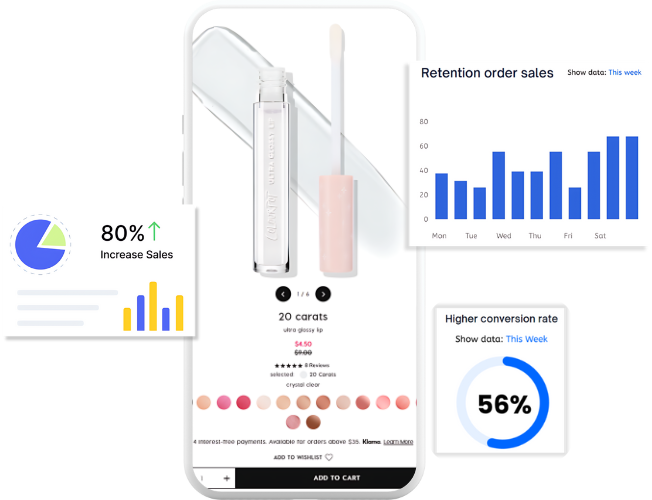Choosing the right e-commerce platform is crucial for businesses seeking online success.
In this comparison, we delve into two prominent options: Ecwid and Shopify.
While both offer robust solutions for building and managing online stores, each has its own unique features and advantages.
Let’s explore the strengths and differences of Ecwid and Shopify to help you make an informed decision for your e-commerce venture.
What is Ecwid?

Ecwid is an online shop platform that lets companies sell goods and services through a variety of channels.
Its flexibility and ease of use make it stand out; customers can quickly add an online store to their current website, social networking profiles, or online marketplaces like Amazon and eBay.
Businesses using Ecwid can easily track sales across several platforms, manage inventory, and take payments.
Pros
Cons
Why choose Ecwid?
Businesses choose Ecwid because of its benefits for the customer, which guarantee easy buying.
Consumers appreciate exploring and buying things on websites, social media, and marketplaces with simple integration.
While secure payment processing fosters confidence, flexible design options cater to a wide range of tastes.
Ecwid offers clients easy access to products with its global reach and multi-channel selling, which promotes customer pleasure and loyalty.
What is Shopify?

Shopify is an e-commerce platform that empowers businesses to create and manage online stores.
It offers a set of tools for creating, altering, and marketing goods online, on social media, and in person.
With capabilities for marketing, payment processing, and inventory management, Shopify facilitates the effective creation and expansion of online presence for companies of all sizes.
Pros
Cons
Why choose Shopify?
Businesses pick Shopify because of its extensive e-commerce solutions that can be customized to meet different demands.
While its rich features, including changeable themes, an extensive app store, and multichannel selling options, boost flexibility and scalability, its user-friendly interface makes store creation quick and easy.
Shopify’s dependable payment processing, secure infrastructure, and committed support team guarantee smooth operations, freeing small businesses to concentrate on expansion and profitability.

Ecwid vs Shopify:2024 Comparison
1. Ecwid vs Shopify: Pricing
Ecwid and Shopify both have tiered monthly price plans.
Ecwid’s price plan is between $0 and $99, while Shopify pricing ranges from $5 to $399 (excluding Shopify Plus).
One key factor that makes Ecwid stand out is its lower options for paid and free plans, which have some limitations, such as the number of products.
Despite being costly, Shopify offers a 3-day free trial and a $1 for 3 months trial, making it an excellent option for trying it out.
2. Ecwid vs Shopify: Ecommerce Tools and Features
Managing and running your e-commerce store is where the real fun starts.
In the race of Ecwid vs Shopify, the difference lies in the availability of e-commerce tools essential for long-term growth and scalability.
With Ecwid, online business is made easier and simpler with tools like inventory management, promo, and multi-channel selling.
Shopify, the website-building platform, provides powerful functionalities including calculated shipping, drop shipping, and multi-currency selling to make it easier to meet your sales target.
3. Ecwid vs Shopify: Ease of Use
Ecwid shines in its simplicity, easily integrating into the current websites that are already developed, making the e-commerce setup process quicker.
Its simple interface and easy-to-follow dashboard allow users to go through the process step by step.
On the other hand, Shopify promotes ease of use with the help of comprehensive tutorials and a drag-and-drop editor that can be used even by beginners and longtime users alike to make their online storefronts unique.
4. Ecwid vs Shopify: Design Flexibility
Ecwid is functional in design and its main focus is the integration with your current website design, which could be a downside in terms of customization compared to the standalone store builders.
On the other hand, Shopify differentiates itself by offering beautiful, mobile-responsive themes designed by professionals and customized to match their users’ brands.
From free to paid themes, users with coding skills can make minute changes to align their store with their particular style and preference.
5. Ecwid vs Shopify: Payment Options and Fees
With Ecwid, you can process credit cards through PayPal, a high-quality payment gateway, without any charges except PayPal’s fee.
Furthermore, Ecwid has about 100 other country-specific payment gateway options; therefore, the taxes and fees to be paid vary depending on your location.
In the same way, Shopify provides over 100 online payment gateways such as PayPal, Stripe, Airpay, and Amazon Pay, including Shopify payments, its own integrated payment system.
Transaction fees are eliminated if Shopify Payments is used, but the credit card rate still exists, with the fee dropping as you opt for more expensive plans.
6. Ecwid vs Shopify: SEO and Marketing
Ecwid’s JavaScript (JS) scripts in online shops can be mistaken for AJAX by search engines, posing challenges for standard SEO.
The “Promotion” setting focuses on partners like Facebook and external trading platforms, lacking standard SEO options.
Basic marketing tools are available, but additional apps are needed for email campaigns. Analytics are limited without third-party integration.
On the contrary, Shopify leads in SEO features among SaaS platforms. It allows easy editing of the on-page SEO aspects such as titles, meta descriptions, and alt text.
Shopify simplifies email marketing with its embedded abandoned cart emails and campaigns.
Shopify offers marketing tools such as email campaigns, retargeting ads, social media, and SEO app connections, which are off-site tools. SEOAnt is an app that is inside the Shopify app store and can help you improve your site’s SEO score.
Optimize store for faster speed and higher rankings
7. Ecwid vs Shopify: Performance and Security
Shopify and Ecwid, both, emphasize the importance of data security.
Ecwid, a Level 1 PCI DSS certified, stores data with Amazon Web Services and regularly scans for breaches. It works on HTTPS, maintaining secure connections through encryption for more safety.
Like Shopify, it is also Level 1 PCI DSS compliant and meets six major security standards.
These include secure network maintenance, cardholder data protection, and robust access control implementation.
Shopify publicly makes a lot of compliance reports available, though some are meant exclusively for active Shopify users.
8. Ecwid vs Shopify: Apps and Integrations
Ecwid provides integrations with different web apps via App Market, including widely used ones like Mailchimp and Xero.
It comes with limited tools compared to Shopify; however, it has essential tools like ShipStation and Taxjar.
In contrast, Shopify’s app store has over 9,000 apps that can address various needs such as SEO, inventory management, customer support, product reviews, and marketing.
Every app from Shopify is checked out to ensure that it is safe, sound, and not a scam. Ongoing app maintenance ensures that it is bug-free and that new features are introduced based on users’ feedback.
Whether it is Ecwid’s purposeful integrations or Shopify’s huge app ecosystem, users can choose products to improve their online stores.
9. Ecwid vs Shopify: Help and Support
Ecwid and Shopify have excellent customer service, and you can contact them. Both have YouTube channels, informative blogs, frequently asked questions (FAQs), and user support forums.
Shopify provides full support for all paid plans, but Ecwid’s level of support varies:
Free Plan: Email.
Venture Plan: Messaging and live chat.
Business Plan: Email, live chat, or phone.
Unlimited Plan: Email, live chat, and priority phone support.
To conclude, Ecwid provides full support solely with the Unlimited plan. However, Shopify extends full support to all its paid plans.
Maximizing Sales: Deep Integration of Shopify and Ecwid

Deeply integrating Shopify and Ecwid can help expand your sales channels and boost your business. Here are some methods to achieve this:
Embedding Ecwid Store in Shopify Website
Embed your Ecwid store into your Shopify website to showcase and sell products on the Shopify platform.
This expands your sales channels, balancing the professionalism of Shopify with the flexibility of Ecwid.
Utilizing Ecwid’s Multi-Channel Sales Feature
Set up and manage multiple sales channels in Ecwid, such as selling products on social media platforms like Facebook and Instagram.
Utilize Ecwid’s multi-channel sales feature to display and sell products on various online platforms, attracting more customers.
Expanding Product Lines and Managing Inventory with Ecwid
Use Ecwid to expand your product lines or manage inventory more flexibly if you encounter product limitations or need greater flexibility on Shopify.
Ecwid helps manage more products and provides more flexible inventory management to meet the needs of different sales channels.
Leveraging Shopify’s Marketing and Analytics Tools

Utilize various marketing tools and analytics features on Shopify to improve sales and understand customer behavior.
For example, use Google and Facebook ads on Shopify and utilize Shopify’s analytics tools to track sales data and customer conversion rates.
Ensuring Unified Customer Experience
Ensure consistent branding and shopping experience across Shopify and Ecwid, including synchronizing information such as product descriptions, prices, and inventory levels.
Optimizing Website Performance
Ensure that both your Shopify website and Ecwid store are optimized to provide fast loading speeds and a smooth shopping experience, thereby increasing conversion rates.
By deeply integrating Shopify and Ecwid, you can leverage the strengths of both platforms to expand your sales channels, manage products more flexibly, and enhance your marketing capabilities, ultimately increasing sales and driving business growth.
5 Reasons to choose Shopify boost your sales
1. User-friendly Shopify 3-day free trial
Shopify gives a user-friendly interface to its new users, providing them with a 3-day free trial to try out its features without any commitment.
This, in turn, gives you enough time to set up and customize your store, get acquainted with Shopify’s interface, and decide if it is worth investing money in.

2. Over 6,000 Shopify apps
Shopify has more than 6000 Shopify Apps available to users.
It means that they have access to a huge platform of tools and integrations that they can use to improve their store’s functions.
Such apps cover multiple areas of e-commerce, including marketing, inventory management, customer support, and more.
These give Shopify merchants the power to customize and fine-tune their online businesses to meet their unique needs.
3. Flexible E-Commerce Solutions
Shopify offers custom e-commerce solutions for businesses at different stages. It caters to startups as well as large enterprises.
Shopify Plus, designed for bigger operations, offers advanced features like customized checkout and dedicated support.
It provides scalable infrastructure to handle high sales volumes. Shopify’s adaptability ensures it offers the necessary tools for the e-commerce journey.
4. Point of Sale (POS) for Business
The Shopify POS system merges online and offline sales.
It enables businesses to manage stock, process transactions, and track sales across multiple channels from one platform.
This flexibility ensures a unified shopping experience for customers, whether online, in-store, or on the go.
It enhances efficiency and customer satisfaction by offering a seamless shopping experience.
5. Professional Shopify expert
Shopify offers access to a community of e-commerce professionals.
They specialize in in-store setup, design, marketing, and optimization. These experts provide valuable support and services to shop owners.
The goal is to help create a professional and appealing online presence. Ultimately, these Shopify experts aim to assist in reaching business goals.
Outro
Finally, Shopify and Ecwid each have unique benefits: Shopify offers a complete e-commerce solution, but Ecwid is better at integrating with already-existing websites.
To obtain the best of both worlds, Ecwid may be integrated into a Shopify store and utilized in conjunction with it.
More scalability and flexibility are provided by this integration, meeting a range of e-commerce requirements.
Specific business requirements should guide the selection of the optimal solution.
FAQs About Ecwid vs Shopify
Note: This blog was originally written in English and translated using an automated tool to make the content accessible to a global audience. We believe in sharing valuable insights with everyone and apologize for any inaccuracies. If you spot any errors, please feel free to contact us for corrections. Your feedback helps us improve and ensures the content’s value is fully realized.

Zero Tan
Content Specialist
As an eCommerce content creator, I aim to share insights, trends, and strategies that may help you navigate the digital marketplace more effectively. My content is designed to provide practical value and inspiration, supporting your business growth and helping you stay informed about industry developments.




